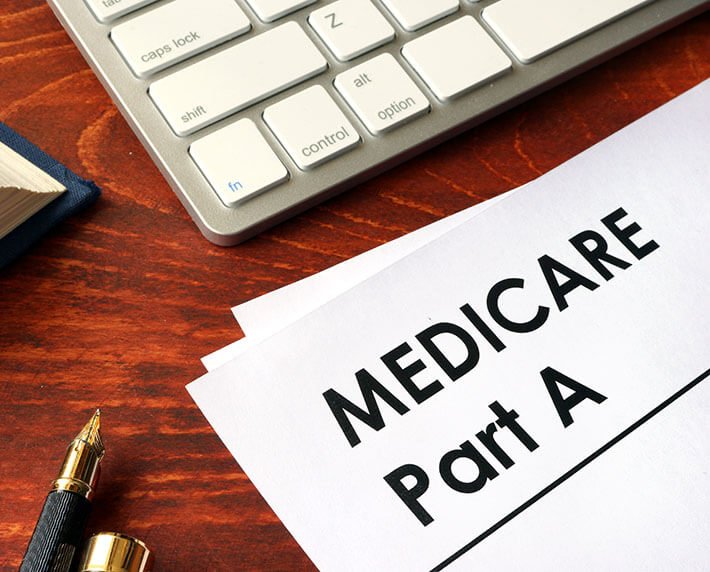Medicare Eligibility: When Am I Eligible For Medicare?


Reviewed by
Paige Geisler
Licensed Insurance Agent
Table of Contents
What is Medicare?
Medicare was initially designed to help older citizens of the United States pay for the costly medical expenses that inevitably occur later in life. Medicare can potentially be helpful for millions of Americans, but it can also be very confusing.
Medicare is broken into multiple different components, each of which may have different qualifications associated with it. Medicare Part A is also known as hospital insurance and covers most expenses related to visiting a hospital or staying at a skilled nursing facility. Medicare Part B is more akin to the typical medical insurance you may already have and will cover most expenses that come from doctors’ visits, outpatient services, mental health care, preventive care, and other things of this nature.
Part A and Part B are the two most basic components of Medicare and collectively are known as Original Medicare. Medicare Part C (Medicare Advantage) is associated with allowances for private health insurance companies, and Medicare Part D is associated with outpatient prescription drug insurance. Each of these parts, though interrelated, faces a uniquely different set of rules and regulations.
When are you eligible for Medicare?
Multiple conditions may affect your current Medicare eligibility. To be Medicare eligible, you must meet at least one of the following conditions:
- Be eligible for social security and at least 65 years old.
For younger people who need help with health insurance payment, you may qualify for Medicaid or numerous other programs (some private, some government-run). However, Medicare is specifically designed for Americans who are in their golden years. - If you are already retired and have begun receiving social security benefits, you may be already automatically enrolled to receive both Medicare Part A and Medicare Part B the day that you turn 65. However, if you are still working, or you are not yet eligible for social security for any other reason, you will not be automatically enrolled, and to receive Medicare Part B, you will have to sign up manually.
- Have a permanent disability and have been receiving disability benefits for at least 24 months.
Even if you are not yet 65 years old, permanent disability can accelerate the time you can begin receiving both Medicare Part A and Part B. Because you must wait two years before you can start receiving these additional benefits, it is a good idea to apply for disability benefits as soon as any permanently debilitating injury, or condition occurs.
What conditions are eligible for Medicare?
There are a few conditions that—because legislators have realized the urgent need for care—will allow you to be Medicare eligible even if you are not yet 65 years old. A few specific conditions that qualify you for early enrollment are:
- End-Stage Renal Disease (ESRD)– you will still need to sign-up for Medicare because enrollment is not automatic, but generally, you should be eligible if you have this condition.
- Amyotrophic Lateral Sclerosis (ALS aka Lou Gehrig’s Disease)– enrollment for both Part A and Part B begin automatically upon qualification for disability benefits.
How much does Medicare cost?
To qualify for Medicare, you must have worked and paid Medicare taxes for at least 40 quarters (10 years).
If you or your spouse is old enough and also have had at least ten years of federally taxed employment, you will likely be eligible to receive Medicare Part A without having to pay the associated monthly premium (about $413 per month as of 2017). With Medicare Part A eligibility, you will have access to complete coverage of most essential hospital services.
Additionally, the premium you might have to pay each month to receive Medicare Part B varies tremendously based on our situation. For example, your premium can be affected by whether or not you are receiving social security benefits, your history as a worker and as a citizen of the United States, whether you are also eligible to receive Medicaid, and numerous other factors.
Typically, these two components of Medicare—Part A and Part B—are known as Original Medicare. Original Medicare is something that all American citizens can potentially receive (with a premium) at some point in their lifetime, depending on their specific situation.
Am I eligible for Medicare Part C and Medicare Part D?
Both Medicare Part C and Medicare Part D are less standardized than Original Medicare. To be qualified for Medicare Part C, you must have first enrolled in Medicare Part A, and Medicare Part B. Medicare Part C is also known as Medicare Advantage, which is supposed to satisfy the “gap” between what you need and what you are eligible to receive.
Medicare Part C is optional. You will not be penalized for not signing up. However, many individuals—especially those will who require extensive care over time—often feel as if Original Medicare is not enough, and therefore, they require something supplementary. There are many different ways you can access Medicare part C such as:
- visiting www.medicare.gov
- calling 1-800-MEDICARE
- through your employer
- through your current health insurance plan
- a licensed insurance agent/broker like True Blue
Once you qualify for Medicare Part C, you will still need to continue making payments on Part A and Part B. The same can be said about Medicare Part D. Part D is designed to help cover prescription drug plans, and like Part C, it is accessed through private insurance agencies that have been approved by Medicare.
Part D is presented in the form of a prescription drug plan (PDP), and can typically be accessed through the same outlets that will help provide you with Medicare Part C. Again, these components of Medicare are not mandatory, instead, they are supplementary. However, many individuals feel that it can save them and their loved ones a substantial amount of money over time.
Understanding your Medical eligibility is very important for long-term financial planning. This guide is designed to give you the basic understanding of the different components of Medicare, and whether or not you are currently Medicare eligible. If you would like to learn more about Medicare eligibility, consider consulting a financial advisor or insurance provider.








